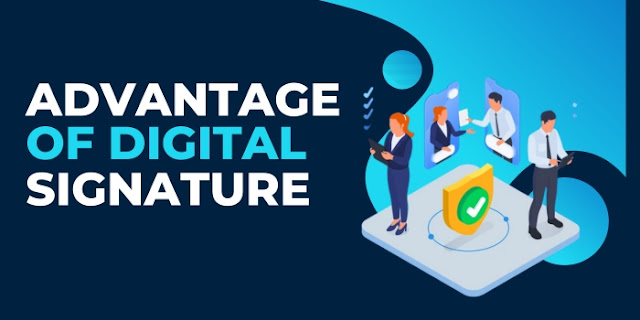What Are The Advantages Of Digital Signature?
In today's digital age, the adoption of technology in various aspects of our lives has become inevitable. One significant transformation is the shift from traditional paper-based signatures to digital signatures. Digital signatures offer a range of advantages that go beyond the convenience of signing documents electronically. In this blog, we will explore these advantages in detail, highlighting how they enhance security and efficiency across various industries.
Enhanced Security
Authentication: Digital signatures provide a robust method of verifying the identity of the signer. They use cryptographic algorithms to link a unique identifier to the signature, making it extremely difficult for anyone to impersonate the signer.
Integrity: Digital signatures ensure the integrity of the document by detecting any alterations or tampering. If even a single character is changed in the document after signing, the signature becomes invalid, alerting the parties involved to potential fraud or unauthorized modifications.
Non-repudiation: With digital signatures, signers cannot deny having signed a document. This feature is crucial in legal and business contexts where accountability and proof of agreement are essential.
Secure Key Management: Digital signatures rely on private keys that are securely stored and controlled by the signer. This adds an additional layer of security as unauthorized access to the private key is difficult to achieve.
Cost Savings
Elimination of Paperwork: Digital signatures reduce the need for printing, scanning, and physically transporting documents. This translates into significant cost savings in terms of paper, ink, postage, and storage space.
Faster Transactions: Traditional signatures often entail delays due to the physical exchange of documents. Digital signatures allow for swift, real-time transactions, resulting in reduced turnaround times and improved customer satisfaction.
Reduced Administrative Overhead: Handling paper documents and manually tracking signatures can be time-consuming and error-prone. Digital signatures streamline these processes, minimizing administrative tasks and freeing up resources for more strategic activities.
Environmental Benefits
Paper Reduction: The adoption of digital signatures contributes to environmental sustainability by reducing the demand for paper. This leads to fewer trees being cut down, lower energy consumption in paper production, and decreased waste.
Reduced Carbon Footprint: Fewer physical document exchanges mean fewer deliveries and transportation, reducing the carbon footprint associated with logistics and distribution.
Global Accessibility
Geographical Independence: Digital signatures enable individuals and organizations to sign documents from anywhere in the world, fostering international collaboration and eliminating geographical barriers.
24/7 Availability: With digital signatures, documents can be signed at any time, allowing for greater flexibility in business operations and accommodating different time zones.
Compliance and Legal Validity
Legal Acceptance: Many countries have recognized the legal validity of digital signatures and have enacted legislation to support their use. This ensures that digitally signed documents are legally binding and admissible in court.
Compliance with Regulations: In highly regulated industries such as finance and healthcare, digital signatures help organizations comply with industry-specific regulations, such as the Health Insurance Portability and Accountability Act (HIPAA) in healthcare or the Sarbanes-Oxley Act in finance.
Document Tracking and Audit Trails
Traceability: Digital signatures create detailed audit trails that record every action related to a document, including who signed it, when, and where. This transparency enhances accountability and facilitates tracking.
Version Control: Digital signatures make it easy to track changes and revisions to documents over time, ensuring that all parties are working with the latest, approved versions.
Improved Customer Experience
Convenience: Customers and clients appreciate the convenience of digitally signing documents from their devices, eliminating the need for in-person visits or mailing physical copies.
Speed: Faster document processing and reduced waiting times enhance the overall customer experience, leading to higher satisfaction levels.
Conclusion
Digital signatures offer a multitude of advantages, including enhanced security, cost savings, environmental benefits, global accessibility, compliance with regulations, document tracking, and improved customer experiences. As technology continues to advance, the adoption of digital signatures will likely become even more widespread, revolutionizing the way businesses and individuals conduct transactions and manage their documents. Embracing digital signatures is not just a matter of convenience but also a strategic move towards greater efficiency, security, and sustainability in today's digital world.
Posted by Krishna

.jpg)
